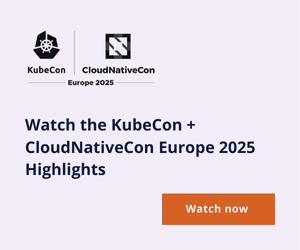KubeCon Europe 2025, held in London from 1st to 4th April, 2025, showcased the maturity and momentum of the cloud-native ecosystem. From evolving AI integration to secure workload identities and platform engineering advances, this year's event focused on pragmatic innovations and community-driven solutions shaping the future of open-source infrastructure.
Speakers from Google, Red Hat, CNCF, Solo.io shared their insights.
This blog post provides a brief summary of the event's themes and some of the most significant conversations about Kubernetes and cloud environments.
Themes of KubeCon Europe 2025
A major theme at the conference was the shift toward practical AI applications. Melissa Greeni from HashiCorp noted that conversations have matured beyond hype. Attendees explored how to secure large language models (LLMs), automate deployment, and integrate AI responsibly into the cloud-native stack. The focus has moved from experimentation to solving real operational problems.
Security and identity took center stage. Teleport introduced its infrastructure identity platform, replacing long-lived secrets with short-lived X.509 certificates to establish zero-trust environments. Their machine and workload identity solution supports automatic credential rotation and SPIFFE standards, helping organizations manage cloud access securely and at scale. These advancements represent a significant step toward eliminating token-based authentication and enhancing security postures.
Platform engineering was another dominant topic. As organizations seek to bridge infrastructure skill gaps, internal developer platforms (IDPs) are becoming essential. HashiCorp’s Terraform Stacks and HCP platform aim to simplify infrastructure as code and reduce the complexity of setup. This trend highlights the growing demand for self-service tools that enable developers to provision infrastructure with minimal operational overhead.
Cerbos’ take on policy-based access control
Alex, co-founder and CPO of Cerbos, highlighted the growing need for fine-grained authorization, especially with the rise of AI agents and non-human identities. On the authorization front, Serbos addressed how policy-based access control can manage modern use cases like AI agent prompts and non-human identities. Their YAML-based policies allow teams to externalize complex authorization logic, enabling cross-stack integration and easier policy audits. The push toward human-readable, CI/CD-compatible authorization is helping streamline governance across microservices and distributed systems.
HashiCorp’s new tool
HashiCorp emphasized practical security and platform engineering solutions. Its new tool, Vault Radar, proactively scans for exposed secrets and integrates them into managed storage, while Terraform Stacks simplifies infrastructure-as-code by enabling reusable, composable deployment patterns. HashiCorp also highlighted the role of its HCP platform in reducing the skills gap by offering pre-configured services for developer self-service.
Teleport’s zero-trust model
Teleport championed a zero-trust model based on short-lived X.509 certificates. Its infrastructure identity platform eliminates long-lived secrets, offering secure machine-to-machine communication and just-in-time access for humans and workloads. Teleport’s support for the SPIFFE standard and its identity visualization tools help teams understand and enforce precise access control across multi-cloud systems.
Mirantis launches Crodant
Dominic Wilde, SVP of Marketing at Mirantis, brought forward an enterprise-focused perspective on Kubernetes’ evolution at KubeCon Europe 2025. To address Kubernetes sprawl and infrastructure inefficiencies, Mirantis introduced Cordant, an open-source solution that simplifies multicluster operations while supporting distributed AI workloads across hybrid environments. Wilde also announced Mirantis’ contribution of the KZer and Cosmatron projects to the CNCF, underlining their commitment to open source. Notably, Mirantis is already demonstrating real-world impact through a customer deployment with Nebble, a European cloud service provider delivering sovereign AI inference services.
Portainer’s approach to container management
Neil Creswell, CEO of Portainer, emphasized the need to simplify container management for mainstream IT teams at KubeCon Europe 2025. As Kubernetes adoption grows, Portainer helps organizations configure environments without requiring deep expertise, enabling the easy deployment of tools like OPA Gatekeeper. By integrating with Telos OS, Portainer now supports cluster creation too. The platform is designed to make container technology more accessible and manageable for enterprises navigating an increasingly complex ecosystem.
Latest developments in the open-source Falco project
Caesar Cysic, a cybersecurity veteran with 20+ years in the field, leads internal risk management and the Field CISO program. Caesar highlighted the rising threat landscape driven by AI-generated code and insecure software. He emphasized the urgency of runtime security in Kubernetes, calling it "prime time for runtime," especially as containers become more ephemeral. As a strong advocate for open-source tools like Falco, now widely adopted by Fortune 500s, Caesar champions better collaboration between security and DevOps. He sees Falco’s evolution as pivotal to modern cloud-native forensics and real-time threat detection.
Overall, the vibe at KubeCon Europe was collaborative and community-driven. Speakers and attendees emphasized the importance of building human-centric tools that simplify complex systems. Whether through policy-as-code, visual role editors, or modular stacks, the goal is clear: empower teams to build securely, scale confidently, and operate more efficiently in the cloud-native era.
KubeCon Europe 2025 marked a turning point for the open-source world — less promotional, more clarity, and a strong commitment to solving real-world infrastructure challenges. As AI, identity, and platform tooling converge, the future of Kubernetes and cloud-native development looks secure, scalable, and remarkably human-focused.
This blog post is based on snippet videos of KubeCon. To watch the videos, visit our YouTube channel here.
The Linux Foundation organises various conventions around the globe throughout the year. Companies from around the world participate in and interact with one another to understand current market trends and requirements. To participate in the upcoming events, visit here.






